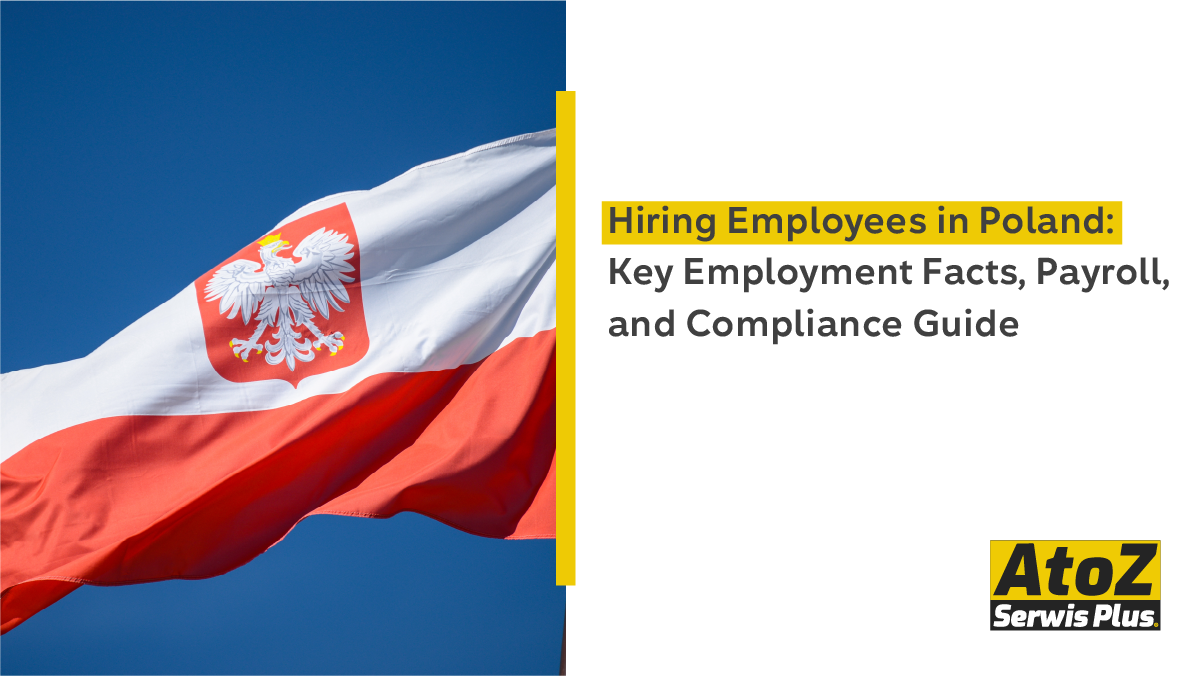

Hiring in Hungary at a Glance: Payroll, Employment Laws, and Employer Costs
Hungary is a growing hub for international businesses thanks to its central European location, skilled workforce, and competitive salaries. Employers looking to expand into Hungary must understand the country’s employment laws, payroll taxes, statutory benefits, and HR compliance rules. This guide provides a complete overview of hiring in Hungary at a glance.
Key Employment Facts in Hungary
|
Category |
Details |
|---|---|
|
Currency |
Hungarian Forint (HUF) |
|
Capital City |
Budapest |
|
Local Language |
Hungarian |
|
Standard Working Hours |
40–48 hours per week |
|
Public/Bank Holidays |
11 days annually |
|
Remote Workers |
1.5% of the workforce |
|
Minimum Monthly Salary |
HUF 266,800 |
|
Tax Year |
1 January – 31 December |
|
Date Format |
YYYY/MM/DD |
|
Misclassification Penalties |
HUF 300,000 – HUF 10,000,000 |
|
Fun Fact |
It is considered rude to clink your beer glasses in Hungary |
Taxes in Hungary
|
Type |
Contribution |
Rate |
|---|---|---|
|
Employer Tax |
Social Security |
13% |
|
Employee Tax |
Social Security Contributions |
18.5% |
|
|
Income Tax |
15% (not applicable under 25) |
|
|
Total Employee Tax Burden |
33.5% |
Showcase your Employer of Record services with AtoZ Serwis Plus. Get featured in our top-ranked country guides. Register here
Hungary Employment Cost Calculator
Employers should account for gross salary + contributions when hiring in Hungary.
How it works:
- Enter annual gross salary.
- Add employer contributions (13%).
- Receive a full salary cost breakdown.
Use this to estimate your total employment costs in Hungary.
Employer of Record (EOR) in Hungary
In Hungary, employing through an Employer of Record (EOR) requires a temporary agency licence. The EOR becomes the legal employer, ensuring full compliance with local labour laws, payroll, and HR practices.
EOR Responsibilities in Hungary:
- Drafting compliant contracts
- Running local payroll and payslips
- Filing taxes and social contributions
- Managing statutory benefits
- Ensuring compliance with Hungarian labour law
|
Role |
Responsibilities |
|---|---|
|
Company |
Directs employees’ work and manages performance |
|
EOR/Agency |
Handles payroll, taxes, compliance, and benefits |
|
Employee |
Works under company direction while legally employed by the EOR |
Statutory Benefits in Hungary
|
Benefit Type |
Details |
|---|---|
|
Medical Examination |
Mandatory for all new hires |
|
Occupational Safety Training |
Required for workplace compliance |
Common Non-Mandatory Benefits in Hungary
|
Benefit Type |
Examples |
|---|---|
|
Company Perks |
Social & cultural benefits, cash bonuses |
|
Work-Life Balance |
Additional days off, flexible work |
|
Insurance |
Health and life insurance |
|
Lifestyle Benefits |
Sports allowance, meal costs, phone costs |
Employee Rights and Protections in Hungary
Employees in Hungary enjoy strong legal protections, including:
- Written employment agreements
- Data protection and privacy rights
- Equal treatment and non-discrimination
- Union membership and collective bargaining rights
- Protection against harassment and unfair dismissal
- Intellectual property protection
- Compensation for non-compete agreements
Leave Entitlements in Hungary
|
Leave Type |
Duration |
|---|---|
|
Paid Annual Leave |
20 days + public holidays (increases with age) |
|
Paternity Leave |
5–7 days |
|
Maternity Leave |
24 weeks |
|
Parental Leave |
2–7 days |
|
Sick Leave |
Up to 15 weeks |
Probation Period and Payment Frequency
|
Category |
Details |
|---|---|
|
Probation Period |
Up to 3 months |
|
Payment Frequency |
Hourly or monthly |
Termination of Employment in Hungary
Employment contracts may end by:
- Mutual Agreement – Flexible termination agreed by both parties.
- Dismissal with Notice – Employers must provide legally valid reasons.
- Immediate Termination – Allowed for serious breaches or during probation.
Employees with over 3 years of service may qualify for statutory severance pay.
Frequently Asked Questions (FAQs) About Hiring in Hungary
What is the minimum wage in Hungary in 2025?
The minimum monthly salary in Hungary is HUF 266,800, with higher rates for skilled positions.
What is the standard work week in Hungary?
Employees typically work 40 hours per week, but in some industries, it may extend up to 48 hours.
How many public holidays are there in Hungary?
Hungary recognises 11 public and bank holidays each year.
Do employers need to provide written contracts in Hungary?
Yes, a written employment agreement is mandatory before work begins.
How long is the probation period in Hungary?
The probationary period can last up to 3 months.
How often are employees paid in Hungary?
Employees can be paid monthly or hourly, depending on the employment contract.
What taxes do employers pay in Hungary?
Employers must pay 13% social security contributions on top of gross salaries.
What taxes do employees pay in Hungary?
Employees contribute 18.5% social security and 15% income tax. Income tax does not apply to employees under 25.
Is there a solidarity tax in Hungary?
No. Hungary does not apply a solidarity tax like some EU countries.
What benefits are mandatory in Hungary?
Mandatory benefits include medical examination for new hires and occupational safety training.
What additional (non-mandatory) benefits do companies provide in Hungary?
Popular perks include extra paid leave, health insurance, life insurance, meal subsidies, flexible work, and bonuses.
How many vacation days are employees entitled to in Hungary?
Employees receive 20 days of paid leave annually, plus public holidays. Additional leave is granted with age.
What is the maternity leave policy in Hungary?
Women are entitled to 24 weeks of maternity leave, with state support.
How many days of paternity leave are available?
Fathers are entitled to 5 days of paid paternity leave (7 in some cases).
What protections do employees have against dismissal?
Employees are protected against unfair dismissal. Employers must provide valid reasons, and special protections exist for specific categories, such as union members.
What is statutory severance pay in Hungary?
Employees with over 3 years of service are entitled to severance pay, with the amount increasing based on years worked.
Can employees join trade unions in Hungary?
Yes. Employees have the right to union membership and to be covered under collective agreements.
Can foreign companies hire in Hungary without a local entity?
Yes. Through an Employer of Record (EOR) or temporary agency licence holder, foreign companies can employ workers compliantly.
Who is responsible for paying employee taxes under an EOR in Hungary?
The EOR (temp agency) files and pays all required taxes and contributions to Hungarian authorities.
Do employees hired through an EOR receive full rights?
Yes. Employees receive all statutory benefits, including paid leave, healthcare, maternity/paternity leave, and protections under Hungarian labour law.
Partner with AtoZ Serwis Plus: Sponsored Articles for Employer of Record Services
Is your company providing Employer of Record (EOR) services? Join us as a Sponsored Article Partner and gain visibility across our high-ranking, country-specific employment and compliance guides.
By partnering with AtoZ Serwis Plus, your company will:
- Be featured in our country-based Employer of Record articles, reaching businesses searching for EOR solutions.
- Receive a prominent logo placement and a direct link to your website for maximum visibility.
- Enhance your SEO ranking and brand authority by partnering with reputable employment and immigration resources.
- Attract new clients looking for payroll, HR compliance, and employment outsourcing solutions worldwide.
Our platform is already indexed at the top of Google search results for EOR and employment-related queries. Becoming a Sponsored Partner ensures your business is seen by companies actively looking for Employer of Record services in Poland and other countries.
Register now and feature your company as a Sponsored Article Partner: https://www.atozserwisplus.com/sponsor/advertise.


















